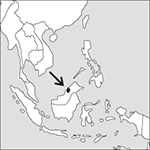
Capital:
Bandar Seri Begawan
Area:
5,765 sq km (2,226 sq miles)
Population:
415,717 (2012 est)
Currency:
1 Brunei dollar = 100 cents
Religions:
Muslim 67.0%; Buddhist 13.0%; Christian 10.0%
Ethnic Groups:
Malay 66.3%; Chinese 11.2%; indigenous 3.4%
Languages:
Malay (official); English; Chinese; minority languages
International Organizations:
UN; Commonwealth; ASEAN; Non-Aligned Movement; WTO; Colombo Plan
A small country on the north-west coast of Borneo, comprising two enclaves surrounded by Sarawak Malaysia.
Physical
A narrow coastal plain of alluvium and peat changes inland to rugged hill country of infertile lateritic soils, the highest point being Bukit Belalong at 913 m (2997 feet) in the south-east. The coast is noted for its oil and natural gas, found both on shore and off-shore. The climate is tropical.
Economy
The economy is almost entirely dependent on oil and natural gas, but Brunei is attempting to diversify into such areas as tourism and financial services.
History
By 1800 the Brunei sultanate, which had once controlled all of Borneo, had been reduced to the regions of Sarawak and Sabah. Control of Sarawak was lost to Sir James Brooke and his successors after 1841, and in 1888 further incursions drove the sultan to accept a British protectorate, which in 1906 was extended through the appointment of a British resident. The Brunei economy was revolutionized by the discovery of substantial onshore oil deposits in 1929 and offshore oil and gas fields in the early 1960s. The sultanate was put under pressure to join the newly formed Federation of Malaysia, provoking a brief rebellion in 1962 of Bruneians opposed to joining Malaysia. Brunei did not join, however, partly because of its natural resources. It achieved internal self-government in 1971 and de facto independence from Britain in 1983 but did not become formally independent until 1994. A state of emergency has been in force since 1962, allowing the sultan to rule by decree. During the 1990s the level of unemployment and social unrest rose. In 1991 the sultan banned the import of alcohol and the celebration of Christmas, measures designed to encourage the population to adopt strict Islamic codes of behaviour. In 2004 the Legislative Council, all of whose members were appointed by the sultan, met for the first time since 1984. In 2009 Brunei and Malaysia resolved their territorial disputes. In 2014 it became the first country in eastern Asia to adopt Sharia law.
- interior path length((of a tree))
- interior point
- interior solution
- interkinesis
- Interkosmos
- interlaced GIF
- interlaced image
- interlaced scanning
- interlacing
- interleaving
- interleukin
- inter-limb angle
- interline transfer device
- interlock
- interlocking
- interlocking directorates
- intermediate-band photometry
- intermediate beach
- intermediate bond
- intermediate bulk container
- intermediate code
- intermediate coupling
- intermediate filament
- intermediate frequency
- intermediate good